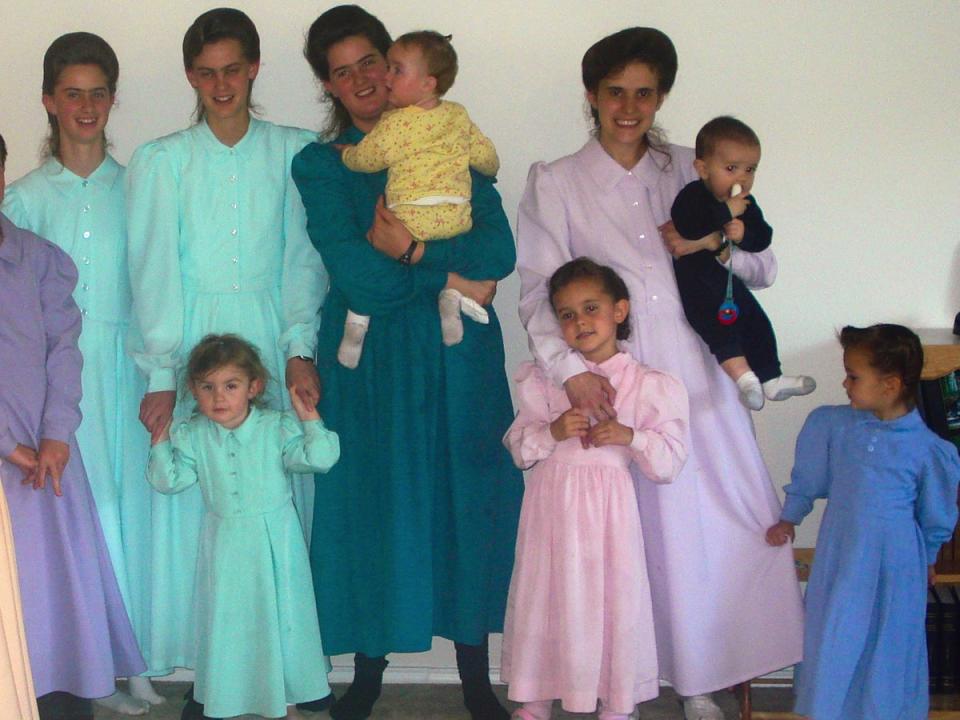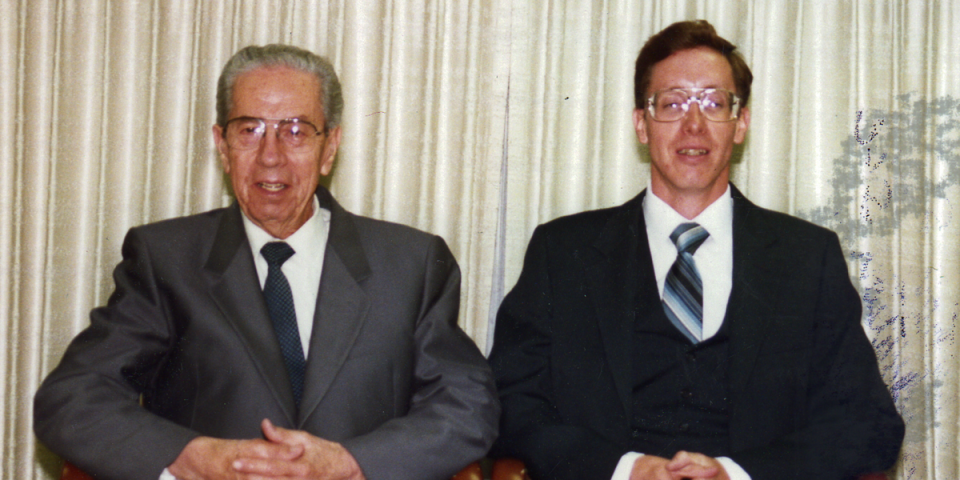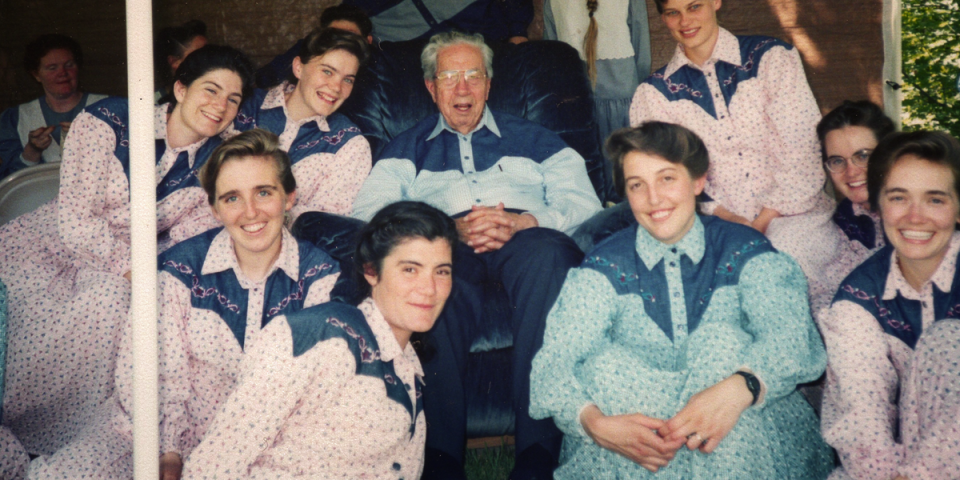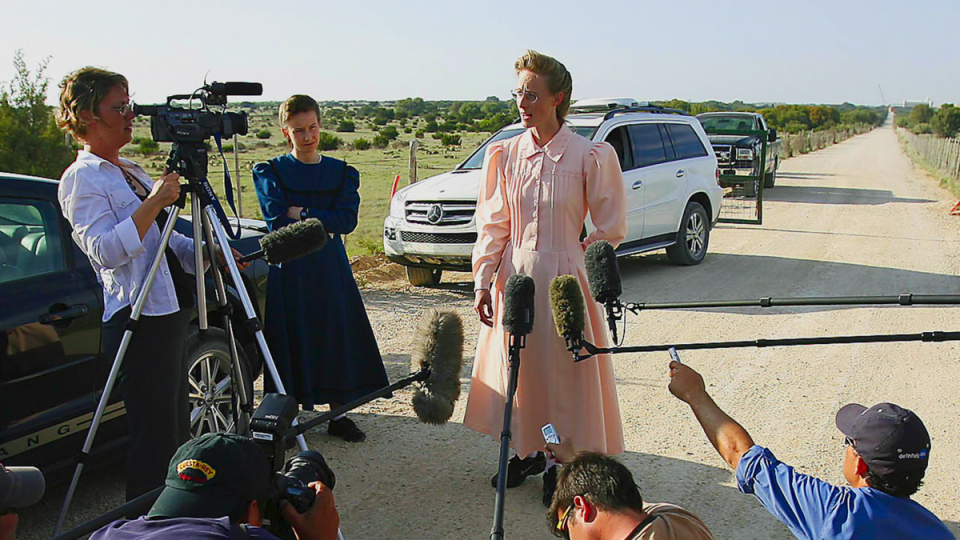Polygamy, underage ‘wives’, and women treated as ‘chattel’: Inside Warren Jeffs’s Fundamentalist Mormon sect

The man known as the prophet was arrested in a red Cadillac outside of Las Vegas. Warren Jeffs, the head of a polygamist sect, had been “living the high life”, a private investigator would later recall. He had been to Disney World. He had celebrated Mardi Gras in New Orleans. He had gone to strip clubs. He had worn “gentile clothing” instead of the clothes he expected his followers to wear. He had kept the company of his “favorite wives”.
At the time, Warren Jeffs was a high-profile fugitive, recently bumped to the FBI’s Ten Most Wanted list. He had been charged in Arizona with two counts of sexual conduct with a minor, one count of conspiracy to commit sexual conduct with a minor, and unlawful flight to avoid prosecution. In Utah, he faced a charge of rape as an accomplice.
On 28 August 2006, a routine traffic stop led to Warren Jeffs’s arrest. The license plates on his vehicle were obscured. He and other passengers were pulled over. Warren’s brother Isaac Jeffs was driving; Warren’s “favorite wife” was in the front seat. Warren himself was “in the back seat, eating a salad”.
The arrest, which led to the first of Warren Jeffs’s convictions, is one of many gripping moments recounted in Keep Sweet: Pray and Obey, a new Netflix documentary dedicated to Jeffs and the Fundamentalist Church of Jesus Christ of Latter-Day Saints.
The FLDS emerged when the Mormon church discontinued polygamy and excommunicated those who kept practicing it. It was incorporated under that name in 1991, though its origins can be traced back to the early 20th century. The group was originally located in Arizona, close to the Utah border, and later expanded into Utah and Texas, with communities in other regions.
Elements of the FLDS story are already familiar to the public. Images of women in long-sleeved, ankle-length pastel prairie dresses, their hair pulled back back in the same braided hairstyle, will ring a bell. (Some of the women themselves spoke to the media after a high-profile police raid of an FLDS ranch in Texas in 2008.) Warren Jeffs’s photo circulated when he became wanted by law enforcement, and when he was twice convicted on criminal charges. Former members who left the sect have provided firsthand accounts of life in the group, of the type of mind control deployed by Jeffs, and of the events that led to their departure.
Keep Sweet: Pray and Obey adds to these existing testimonies by painting a portrait of the FLDS as a structure of coercive control and systemized abuse, in which Warren Jeffs – and his father before him – made themselves into so-called “prophets” and weaved religious doctrine in service of their own domination.
Warren Jeffs’s name has become synonymous with the FLDS, but the movement had existed for decades, partly under different names, by the time he became its leader. Leroy S Johnson was the head of the Council of Friends (now viewed as an early iteration of what became the FLDS) from the Fifties to his death in 1986. Warren Jeffs’s father Rulon Jeffs took over that same year. He was known among members of the FLDS as “the prophet”, an undisputed ruler within the group.
A man’s status depends on how many wives he has
Rulon Jeffs lived his years as the FLDS prophet much like Warren Jeffs later would, according to accounts given by former members of the sect. Rebecca Wall, a participant in Keep Sweet: Pray and Obey who was raised in the FLDS, recounts being married to Rulon Jeffs, then 85, when she was 19. Her account is a scathing illustration of the power dynamics in which women and girls, evidently, were treated in the FLDS like something resembling currency, pawns in the sect’s political games.
“A man’s status depends on how many wives he has,” Wall says in episode one. “My dad – he had two wives, and he couldn’t figure out why other men were getting more wives and he was not. So my dad always felt like he was jilted. … He was always kind of frustrated. But he also had this host of daughters that could be given to other men. And it’s kind of like, ‘I’ll give you some if you give me some.’ Even though it’s never spoken that way, I think that’s the general understanding.”
People in the FLDS did not choose who they married. The way Wall recounts it, girls were given over to the prophet once it was deemed time for them to wed, and the prophet decided on marriages himself.
“When I turned 19, my father brought me to Rulon Jeffs,” she continues. By then, Wall says, it was known that Rulon Jeffs had a specific handshake he used with “girls who would later become his wife”. He shook her hand and squeezed it three times. “That meant I was supposed to marry him,” she adds. “My dad was so excited. For any man in the FLDS, to have their daughter marry into the prophet’s family, was a massive honor. And I think my dad felt like finally he was getting the respect that he was entitled to and that he deserved. But I was just like, ‘Ew.’ … I got married, and then my father got his third wife.”
Rulon Jeffs died in 2002. His death was a time of confusion, recounted candidly in the documentary: Members of the FLDS had been taught that the prophet was immortal – literally. “I truly believed that any minute, he was going to sit up and be renewed,” Elissa Wall, who grew up in the FLDS and says she was forced to marry her cousin aged 14, recounts. “They closed the casket and there was this overwhelming fear inside of me. If they put him in the ground, how is he going to get out?”

It could have been a damning moment for the FLDS, proof that a key part of the doctrine (that the prophet could not die) was false. But Warren Jeffs succeeded to his father as prophet, and, per Elissa Wall, began speaking as though he was “his father renewed”. He married his father’s wives. His ways didn’t sit well with some members. “I went to my husband, and I said, ‘Something’s wrong,’” Charlene Jeffs, who was married to Warren Jeffs’s brother Lyle Jeffs, recounts. “And he said, ‘Nothing our prophet does is wrong.’”
Warren Jeffs enforced stricter rules than his father. Members were to abstain from any form of fun. Lloyd Wall, Rebecca Wall’s father, says a “big” change for him was having to turn in all his guns. But a lot of rules targeted women specifically: under Rulon Jeffs, they had to be “covered”; under Warren Jeffs, they were forbidden to wear denim, prints, or the color red. They were then expected to wear long underwear covering their entire bodies to their wrists and feet. Their hair had to be done and braided. The women listened, Charlene Jeffs says, because they thought this was their path to salvation.
Keep Sweet: Pray and Obey is at its most powerful when it ventures outside the strict limits of the FLDS to look at the wider forces that allowed the group to keep going for decades, even as it existed in plain sight, with the knowledge of at least some of the local authorities. In a damning sequence, journalist Mike Watkiss, who investigated the FLDS for years, is seen, camera on his shoulder, telling a police officer in Short Creek (now known as the towns of Colorado City, Arizona, and Hildale, Utah): “Utah Constitution says that polygamy is illegal, and I guess there’s laws on the books in Arizona that say the same thing. Why don’t people get arrested here?”
“You know, I’m–” the police officer begins, then replies: “I mean, we’re in – we believe in plural marriage.” (That officer, Mica Barlow, was later reported to have written in a letter of support for Warren Jeffs while Jeffs while a fugitive: “I want to be an extension of you in the police department or whatever you would have me be.” In 2006, he was one of two men held in contempt of court for refusing to testify about Warren Jeffs in front of a grand jury.)
“People are entitled to believe what they want, but the law currently in the United States is that polygamy is not a protected constitutional right,” Roger Hoole, an attorney in Utah featured in the documentary, says. Yet, despite being illegal, it is “almost never prosecuted.”
“It’s hard to prove, and law enforcement and politicians are not very interested in disrupting families,” he adds. “I think most people in Utah, the mainstream Mormons – people like me – see polygamy as an embarrassment. But polygamy is really not the problem anyway. It’s the secondary crimes that occur in a closed religious society controlled by men. That’s when all sorts of mischief can take place, and that’s what happened with the FLDS.”



Most of the men in the FLDS regarded women as “chattel”, Wallace Jeffs, one of Rulon Jeffs’s sons, says at one point. Members of the FLDS were taught that men needed to have at least three wives in order to reach “the highest degree of the celestial kingdom”. Then, a man would “basically become a god”.
“And what happens to the women? Do they become gods?” Wallace Jeffs is asked during his interview. He laughs, then says: “That is kind of a gray area. We were never taught what a woman becomes on the other side, other than a wife.”
Ruby Jessop, one of the participants in the documentary, says Warren Jeffs ordered her to be married to her second cousin when she was 14. “There had historically been underage marriages in the FLDS,” Hoole says, “but they took off on steroids under Warren Jeffs.” The “pattern”, he adds, “seemed to be that with a girl that was a little bit independent, the idea was to get her married young and pregnant, and she would be locked in.”
In 2011, Warren Jeffs was convicted in Texas of sexually assaulting two girls. He was sentenced to life in prison for sexually assaulting a 12-year-old girl and 20 years for sexually assaulting a 15-year-old girl. This was four years after Jeffs’s 2007 conviction on two charges of being an accomplice to rape in Utah, for which he was sentenced to 10 years to life in prison. The Utah Supreme Court overturned the conviction in 2010. By then, the Texas charges were already pending.
During the sentencing phase of the Texas trial, evidence reflected that Jeffs was “involved in conducting the marriages of 67 underage girls to FLDS men”, says Angela Goodwin, a former US Attorney Special Prosecutor. Jeffs himself, she adds, “had himself 78 wives – 24 of those wives were underage.”
Warren Jeffs is believed to still be running the FLDS and exercising influence on members from prison. Former members who have left the FLDS describe being estranged from their relatives still within the group in Keep Sweet: Pray and Obey. “Three of us are out,” Lola Barlow, who was in the group as a child, says. “The rest of everybody’s still in. I could just drive to their house and talk to them. But they won’t talk to me.”

 money
money 